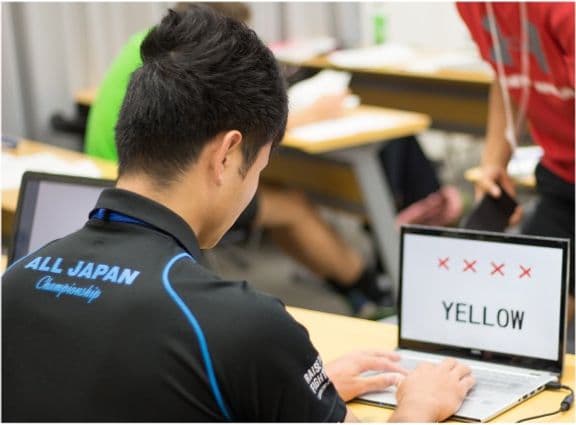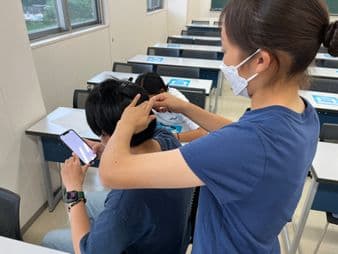Research
Exploring "Conditioning" to Maximize Human Performance
Research Philosophy
"Sports Science through Experience, Trials, and Contribution"
Our laboratory emphasizes field experience, conducts scientifically-based trials, and contributes findings to society. We have developed innovative assessment methods including analysis of accumulated hormones in hair for long-term stress evaluation and prediction of arousal states through facial expression changes. From brain function measurement using fNIRS/fMRI to elucidating the relationship between exercise and cognition, to verification of new training methods using VR technology, we employ multifaceted approaches to achieve performance enhancement and well-being for everyone, from top athletes to the general public.
Fatigue Prevention and Brain Function Enhancement
Integrated Understanding of Exercise, Environment, and Brain Function
Exercise significantly affects not only muscle and cardiopulmonary function but also brain functions (executive functions such as inhibitory control and working memory, attention, and decision-making abilities). Our laboratory has demonstrated that VR exercise improves working memory and positive mood, and we are developing new technology to predict brain fatigue states from facial expression changes during exercise.
We have also revealed that the cognitive enhancement effect of exercise is weakened under hypoxic conditions, identifying that the cause is blood hypoxic state during exercise. Currently, we are working to elucidate the common physiological factors underlying cognitive fatigue and brain fatigue.
Measurement Equipment
Research Objectives
Identifying optimal exercise conditions and establishing intervention methods for exercise-induced and cognitive fatigue in athletes

Performance Maximization

Conditioning Assessment Using Innovative Biomarkers
Our laboratory was the first in the world to demonstrate that hair cortisol and oxytocin can serve as physiological indicators of training stress and psychological states in female athletes. We have also developed new technology to predict decreased psychological arousal from facial expression changes during exercise, and established mental health assessment methods using heart rate variability (HRV) for top athletes. In terms of recovery, we are investigating practical approaches such as foam rolling and facial expression control for fatigue recovery and performance enhancement.
🏆Research Participants to Date
- •University Student Athletes
- •Japanese National Wheel Gymnastics Athletes
- •Japanese Women's Basketball Top League Players
💡Innovative Assessment Methods
Developing assessment methods using novel biomarkers such as hair and facial expressions
Research Achievements
Research Achievements
Major Publications
Research Theme 1: Fatigue Prevention and Brain Function Enhancement
Facial Lower-Region Changes During High-Intensity Exercise as Predictors of Reduced Arousal State
Journal of Sports Sciences
DOI: 10.1080/02640414.2025.2574109Exercising with virtual reality is potentially better for the working memory and positive mood than cycling alone
Mental Health and Physical Activity
DOI: 10.1016/j.mhpa.2024.100641Cognitive fatigue due to exercise under normobaric hypoxia is related to hypoxemia during exercise
Scientific Reports
DOI: 10.1038/s41598-022-14146-5The Effects of Acute Virtual Reality Exergaming on Mood and Executive Function
JMIR Serious Games
DOI: 10.2196/38200Neural basis for reduced executive performance with hypoxic exercise
NeuroImage
DOI: 10.1016/j.neuroimage.2017.12.091Hypoxia-induced lowered executive function depends on arterial oxygen desaturation
The Journal of Physiological Sciences
DOI: 10.1007/s12576-018-0603-yResearch Theme 2: Performance Maximization
Integrating Heart Rate Variability and Hair Hormone Monitoring for Athlete Wellness: Practical Insights from a 22-Month Self-Monitoring Case Study
Research Square (preprint)
DOI: 10.21203/rs.3.rs-7872377/v1Changes in Hair Cortisol and Oxytocin Independently Associate with Positive and Negative Psychological States in Female Soccer Players
Frontiers in Sports and Active Living
DOI: 10.3389/fspor.2025.1742869Pitch Selection Ability and Spatial Executive Function Independently Predict Baseball Batting Performance
Sports
DOI: 10.3390/sports13100367Foam Rolling Intervention Improves Lactate Clearance After High-Intensity Exercise
Sports
DOI: 10.3390/sports12110303Hair cortisol is a physiological indicator of training stress for female footballers
European Journal of Applied Physiology
DOI: 10.1007/s00421-024-05571-7The Potential of Heart Rate Variability Monitoring for Mental Health Assessment in Top Wheel Gymnastics Athletes: A Single Case Design
Applied Psychophysiology and Biofeedback
DOI: 10.1007/s10484-023-09585-3Ongoing Research Projects
Establishing Chronic Stress Assessment Using Hair Cortisol for Physical Activity Promoting Healthy Development
Funding Agency: Japan Society for the Promotion of Science
Type: Challenging Research (Pioneering)
Does Exercise-Induced Peripheral Blood Lactate Elevation Cause Prefrontal Cortex Lactate Elevation Related to Cognitive Fatigue?
Funding Agency: University of Tsukuba ARIHHP
Type: Joint Use/Research
Imaging the Vulnerability of Cerebral Cortical Microvascular Function to Hypoxia and Elucidating Its Cytohistological Basis
Funding Agency: Japan Society for the Promotion of Science
Type: Grant-in-Aid for Scientific Research (B)
PI: Atsuhiro Tsubaki
Development of a System to Enhance Self-Conscious Problem-Solving Strategies of Physical Education Teachers
Funding Agency: Japan Society for the Promotion of Science
Type: Grant-in-Aid for Scientific Research (C)
PI: Yasuyuki Nishihara
High-Sensitivity Comprehensive Analysis of Hair Lipids Using MALDI-TOF/MS and Its Application to Long-Term Mental Fatigue Assessment
Funding Agency: Japan Society for the Promotion of Science
Type: Grant-in-Aid for Scientific Research (C)
PI: Kenji Nakayama
For detailed research achievements, please visitresearchmap
For Those Interested in Our Laboratory
If you would like to visit or discuss, please feel free to contact us
Contact Us →